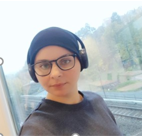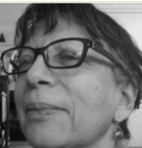Originally translated to Italian from the Arabic by Sana Darghmouni. Translated from the Italian by Pina Piccolo.
The sea shawl
(First appeared in Italian in La Macchina Sognante Inserto Palestina)
Twenty minutes had passed since I had left, my legs kept running on their own, my mind kneading thoughts. I could no longer distinguish between my breathing and the sound of the bombing, fragments of body parts and blood of strangers crossing my path along a road that had lost its face.Just another nameless death.
I could not see, yet a single image did materialize in front of me, that of a column and the sea shawl.
My father was martyred in a war.
But I have always been confident that he would come back for me, so we could return to the place where we used to catch quail with a special net we called the ‘shawl’. My father pulls the shawl towards the column and sits next to time telling me stories of his grandmother, stories about the olive groves, the stovetop espresso coffeemaker and the grinder that used to belong to my grandfather – the one with a big mustache – and concludes our sessions with a promise:
I will always be here, I have a date with the waves.
The column and the shawl are my podium to the eternal world, ’my father’s voice’ and I will not allow the bombs to swallow them.
The streets blended into one another, my heart could no longer distinguish them.
What path should I take?
The scene faded under the air raids and shelling, the features of the buildings melted together in a deadly crowd, the roofs embraced their mother’s breast, the ground – everything mixed up in a terrible picture of fragmented life and blood. The school turned into a colorless concrete net that trapped the memory of passers-by. Bodies running at random, looking for shadows while others flew by.
Doorway to my home, I beg of you, Wait: How can I stop time?
A civil defense man turned to me and shouted:
-You, little girl, stop, there is nothing but death out here.
– No.
I kicked the words and leapt to my postponed ascension where the wind joined the waist of the shawl, the braids of the sea, the quail and my father.
A cry got stuck in my legs, can the ground cry?
It’s a child trapped by stones and blood.
Here, here – I screamed at the rescuers
Hands were pushing towards her from all directions, one of them uttered a sentence made of anxiety:
-What made you leave home? Run back in, it’s the War.
I ignited my indifference and kept running.
I was getting closer and so did the squeak coming from the plane.
The artillery started its deadly shelling everywhere, everyone jumped away, screaming at me:
-Go back, little girl, you will die.
Ignoring everything I ran to our appointed meeting, I will save the column and the shawl. A race started between me and the end, you won’t steal my father’s voice, you won’t kill the memory.
Oh God, here I am, suddenly silence reigned and there was no more light, a halo of thick smoke clouded all images. It rose, and with the speed of nostalgia it rubbed my eyes. It was my father standing in the air, smiling, holding out his hands to me.
I grabbed him anxiously, like a bubble and began to rise as the shawl waved me farewell, embracing the fragments of its column, both absent from sleep.
With a triumphant gaze, I looked away from a broken body dissolved in the red sand tickled by the waves, a body that had been me, just a short while ago.
I am rising, my father carries me, we fly over the plane.
__
A Picture without Limbs
Pinned in front of the scene, people running in whichever direction, war showcasing itself as a running competition. People run even faster and bullets are intelligent nets that explode over the target’s head. The scene is as crazy as he is, and he has to do something to lighten the intensity of this hell. His fingers flashed as a raging bullet went off, he pulled out a blank canvas which he attached to the easel and then grabbed the palette and a brush.
A woman, carrying her children like a kangaroo in every pocket, passed by him and ran off. At an insane speed he drew a bulletproof steel shelter. As soon as he finished it, the shelter leapt toward the street and rose into being, the door opened and the lady jumped inside.
The fragments of the bullet scattered about as cold as the moorlands whose seeds have not sprouted yet. The thing was starting to work, so he scanned his surroundings carefully.
At the end of the street, a child drowned in his own blood, cut off from the rescue teams.
He turned to his painting, which by then had returned to its white state again, and plunged back into the drawing. The rescuers rushed out of the frame, unfinished, without legs, running towards the boy. The painter smiled with joy, it was working better. He went back to his painting, drawing ambulances, steel roofs, anti-missile shields, drawing many things and then freeing them so that the scene would take a different course over the next few seconds.
The bullet stopped, it no longer felt rage, it didn’t feel anything at all, all his feelings had disappeared. It settled into his body and melted until it became a real echo and a scream. The fall was the last thing his consciousness remembered, the canvas stained with blood, creating another new scene, a stable one this time.
Unidentified sounds pass through his ears.
One of the rescuers said: It doesn’t spare anyone.
Another rescuer answered him: That’s the way all wars are.
-Who is going to tell him?
-You, it’s your turn, I informed the people before him.
-Make it quick then!
The voice approached and went on.
-I regret to inform you, that you have lost both your arms and the easel.
Translator's Note
I was faced with many challenges as well as creative opportunities when I set out to translate Wesam Almadani’s two prose poetry pieces “The Sea Shawl” and “A picture without limbs” into English from the Italian translation provided by Sana Darghmouni from the Arabic original and published in June 2021 in the Inserto Palestina of La Macchina Sognante.
What attracted me about the two pieces was their surrealist undercurrent, more subtle in the first one and very evident in the second one. The author is constantly playing with and intertwining very concrete, objective elements (bodies in motion, collapsing buildings, the deafening noise of the air raids and shellings) the actual, chaotic physical response by people and objects, the subjective feelings elicited by the mayhem, a mix of fear, desire to survive, wish for omnipotence in the face of powerlessness, memories, the yearning to be with loved ones, an attempt at enlisting the solidarity of the surroundings whether they be animate or inanimate.
Many of the contemporary pieces concerning Gaza that I had previously translated tended to approach similar settings in a drier, witness reporting style (even when exploring the psychological consequences of living in a place like Gaza) or in a denunciatory vein, in which memory was associated with history or sociology, sometimes deploying irony to underscore the unfairness of it all.
The closest texture of writing that I had encountered so far were a series of performance poetry pieces by Suheir Hammad, the Gaza Suite, written in 2008/9 during the violent attack against Gaza by Israel that lasted over two months. In those pieces, the paroxysm of war was conveyed through a mix of objective and subjective elements, deeply layered in a rich emotionally metaphoric connective tissue, which had times had a surrealist bent, and had echoes of Mahmoud Darwish, but was clearly written by a poet that belonged to a younger generation and had gone through the experience of spoken word and performance poetry.
What distinguishes Wesam Almadani’s pieces from Suheir Hammad though is the distinct feeling that the writer has been physically in that situation. In other words, there is a lived experience aura attached to the pieces, that may be missing from Suheir Hammad on account of her being born in diaspora and not having had the direct experience.
At times I got carried away by the surrealist undercurrent, especially in The Sea Shawl, making up in my head symbolisms and chains of meaning that were more elaborate than the author had intended. However, fortunately I was able to clear it with the writer before spreading fake metaphors unintentionally created by me as the translator.
Part of the problem stemmed from the fact that Italian has gender even for inanimate objects, so in translating it from the Arabic, Sana had to provide all the gendered agreements for all parts of speech, whereas English would have solved everything with the gender neuter ‘it’ (except for plurals, where the they could be either animate or inanimate).
The problem was far less serious in the second piece, which more clearly sets up a surrealist situation (though through a build-up of ambiguity that alerts the reader that maybe things are not as they ‘should’ be).
What I like about “A picture without limbs” is the multitude of levels of interpretation it provides: it could be simply the chronicle of an episode of mental illness in the midst of a war or it could be a warning parable for those who assign excessive power to the redemptive or healing powers of art. In the latter case, the bureaucratic closing lines should be appreciated in their ferocious sarcasm.



























0 Comments